AIS
-
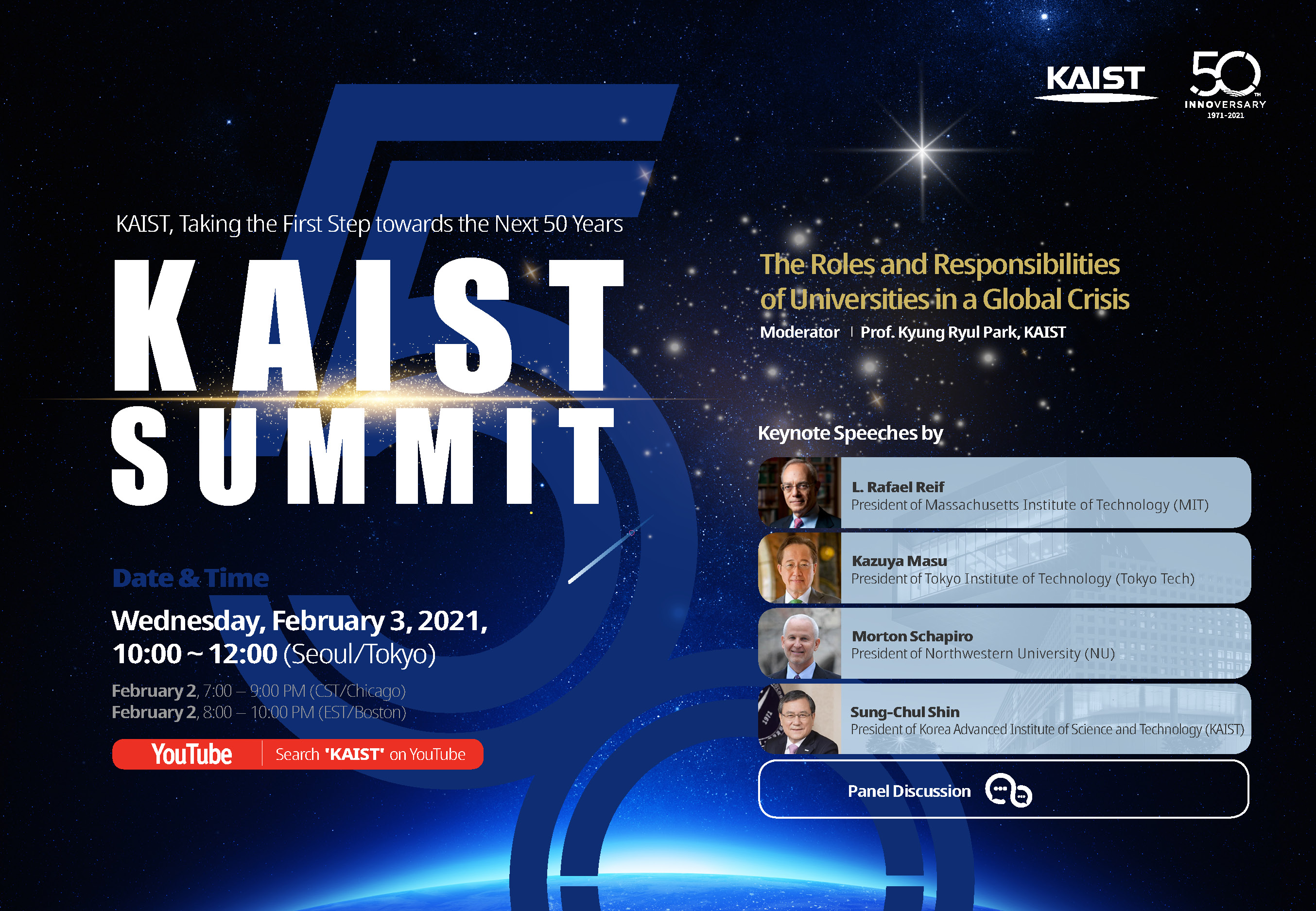 Top University Leaders Urge Innovation for the Post-COVID Era at the KAIST Summit
- Presidents of KAIST, MIT, Tokyo Tech, and Northwestern to define new roles and responsibilities of universities for the post-COVID and 4IR eras during an online summit in celebration of KAIST’s 50th anniversary. -
Universities are facing ever-mounting pressure to address impacts brought on by COVID-19 and the emerging technologies of the Fourth Industrial Revolution (4IR).
Presidents from MIT, Tokyo Tech, and Northwestern University will join the KAIST Summit to explore new directions for higher education during the post-COVID era intertwined with the 4IR. They agree that addressing these dual challenges requires pushing for innovations to rebuild the competitive edges of universities.
This summit is one of KAIST’s series of events to envision the future of KAIST and higher education in celebration of its 50th anniversary. The online summit will be live streamed on KAIST’s official YouTube channel (https://www.youtube.com/c/KAISTofficial) on February 3, 2021, from 10 a.m. to 12:00 p.m. Korean time (February 2, 7:00-9:00 p.m. CST and 8:00-10:00 p.m. EST, respectively).
The KAIST Summit titled “The Roles and Responsibilities of Universities in a Global Crisis” will discuss a range of issues affecting many aspects of universities in the coming decades.
“This summit will allow us to measure the level of risk that universities face today and will face in the future. Although there will be varying views on what a post-COVID world might look like, one thing for sure is that universities cannot go back to the way they used to exist and operate. Moreover, the 4IR continues to infiltrate and shake up our daily lives. Changes are inevitable, and universities must pursue bold and innovative responses to remain sustainable and relevant to society,” said KAIST President Sung-Chul Shin on the background of hosting the event.
The keynote speakers include KAIST President Shin, MIT President L. Rafael Reif, Tokyo Tech President Kazuya Masu, and Northwestern University President Morton Schapiro. After the keynote speech session, the speakers will take part in a panel discussion on three topics: “The Digital Divide,” “Emerging Challenges in AI,” and “Social Entrepreneurship and University-Industry Collaboration.” A Q&A session with an online audience consisting of KAIST faculty, staff, and students as well as high school students across the nation will follow shortly afterwards.
President Reif of MIT will congratulate KAIST on its successful 50-year journey from meager beginnings to achieving its current status as one of the finest global universities in science and technology. Then he will give a talk titled “Universities as Engines of Change” to present how universities have played a critical role in advancing solutions to humanity’s most urgent problems.
President Masu of Tokyo Tech will stress the importance of universities’ continuous dialogue with society as drivers of innovation. In his speech titled “Designing Our Future—Tokyo Tech DLab’s Approach,” he will introduce the activities of Tokyo Tech’s Laboratory for Design of Social Innovation in Global Networks (DLab) and explain how DLab collaborates for the future with members of society.
President Schapiro of Northwestern University will speak about how universities might incorporate the lessons they learned in dealing with COVID-19 to improve their research, teaching, and public service in the post-pandemic era. He will also look into issues arising from changing labor market needs associated with the 4IR and the aftermath of COVID-19 in his talk titled “The University in the ‘New Normal.’”
Finally, President Shin of KAIST will deliver a presentation on the “Visions & Innovations for the Next Dream of KAIST.” He will reflect on the remarkable track record from KAIST’s first 50 years and how it has contributed significantly to the rapid growth of Korea as a hi-tech powerhouse. Furthermore, he will elaborate on a new vision for the development of KAIST over the next 50 years and roll out a set of strategic innovation plans in the five areas of education, research, technology commercialization, globalization, and future strategy.
In the panel discussion, the four presidents will dive into a more intense conversation on such topics as universities’ role in bridging the increasing digital divide through their research, education, and international cooperation; the socioeconomic implications and ethical challenges of the fast deployment of AI and robotics; 4IR disruptions that will transform higher education; ways to foster social innovation and youth entrepreneurship; and how to build university-industry cooperation.
More information on KAIST’s 50th anniversary celebrations can be found on its special celebratory website at https://50.kaist.ac.kr/eng/. The official anniversary ceremony is scheduled for February 16, 2021, from 10 a.m. Korean time, and live-streaming will also be made available on KAIST’s official YouTube channel at https://www.youtube.com/c/KAISTofficial.
(END)
2021.02.01 View 17248
Top University Leaders Urge Innovation for the Post-COVID Era at the KAIST Summit
- Presidents of KAIST, MIT, Tokyo Tech, and Northwestern to define new roles and responsibilities of universities for the post-COVID and 4IR eras during an online summit in celebration of KAIST’s 50th anniversary. -
Universities are facing ever-mounting pressure to address impacts brought on by COVID-19 and the emerging technologies of the Fourth Industrial Revolution (4IR).
Presidents from MIT, Tokyo Tech, and Northwestern University will join the KAIST Summit to explore new directions for higher education during the post-COVID era intertwined with the 4IR. They agree that addressing these dual challenges requires pushing for innovations to rebuild the competitive edges of universities.
This summit is one of KAIST’s series of events to envision the future of KAIST and higher education in celebration of its 50th anniversary. The online summit will be live streamed on KAIST’s official YouTube channel (https://www.youtube.com/c/KAISTofficial) on February 3, 2021, from 10 a.m. to 12:00 p.m. Korean time (February 2, 7:00-9:00 p.m. CST and 8:00-10:00 p.m. EST, respectively).
The KAIST Summit titled “The Roles and Responsibilities of Universities in a Global Crisis” will discuss a range of issues affecting many aspects of universities in the coming decades.
“This summit will allow us to measure the level of risk that universities face today and will face in the future. Although there will be varying views on what a post-COVID world might look like, one thing for sure is that universities cannot go back to the way they used to exist and operate. Moreover, the 4IR continues to infiltrate and shake up our daily lives. Changes are inevitable, and universities must pursue bold and innovative responses to remain sustainable and relevant to society,” said KAIST President Sung-Chul Shin on the background of hosting the event.
The keynote speakers include KAIST President Shin, MIT President L. Rafael Reif, Tokyo Tech President Kazuya Masu, and Northwestern University President Morton Schapiro. After the keynote speech session, the speakers will take part in a panel discussion on three topics: “The Digital Divide,” “Emerging Challenges in AI,” and “Social Entrepreneurship and University-Industry Collaboration.” A Q&A session with an online audience consisting of KAIST faculty, staff, and students as well as high school students across the nation will follow shortly afterwards.
President Reif of MIT will congratulate KAIST on its successful 50-year journey from meager beginnings to achieving its current status as one of the finest global universities in science and technology. Then he will give a talk titled “Universities as Engines of Change” to present how universities have played a critical role in advancing solutions to humanity’s most urgent problems.
President Masu of Tokyo Tech will stress the importance of universities’ continuous dialogue with society as drivers of innovation. In his speech titled “Designing Our Future—Tokyo Tech DLab’s Approach,” he will introduce the activities of Tokyo Tech’s Laboratory for Design of Social Innovation in Global Networks (DLab) and explain how DLab collaborates for the future with members of society.
President Schapiro of Northwestern University will speak about how universities might incorporate the lessons they learned in dealing with COVID-19 to improve their research, teaching, and public service in the post-pandemic era. He will also look into issues arising from changing labor market needs associated with the 4IR and the aftermath of COVID-19 in his talk titled “The University in the ‘New Normal.’”
Finally, President Shin of KAIST will deliver a presentation on the “Visions & Innovations for the Next Dream of KAIST.” He will reflect on the remarkable track record from KAIST’s first 50 years and how it has contributed significantly to the rapid growth of Korea as a hi-tech powerhouse. Furthermore, he will elaborate on a new vision for the development of KAIST over the next 50 years and roll out a set of strategic innovation plans in the five areas of education, research, technology commercialization, globalization, and future strategy.
In the panel discussion, the four presidents will dive into a more intense conversation on such topics as universities’ role in bridging the increasing digital divide through their research, education, and international cooperation; the socioeconomic implications and ethical challenges of the fast deployment of AI and robotics; 4IR disruptions that will transform higher education; ways to foster social innovation and youth entrepreneurship; and how to build university-industry cooperation.
More information on KAIST’s 50th anniversary celebrations can be found on its special celebratory website at https://50.kaist.ac.kr/eng/. The official anniversary ceremony is scheduled for February 16, 2021, from 10 a.m. Korean time, and live-streaming will also be made available on KAIST’s official YouTube channel at https://www.youtube.com/c/KAISTofficial.
(END)
2021.02.01 View 17248 -
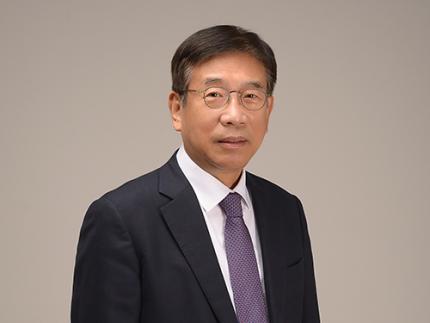 Emeritus Professor Jae-Kyu Lee Wins the AIS LEO Award
Emeritus Professor Jae-Kyu Lee has won the Association for Information Systems LEO Award 2020. Professor Lee, the first Korean to receive the LEO Award, was recognized for his research and development in preventative cyber security, which is a major part of the efforts he leads to realize what Professor Lee has named "Bright Internet."
Established in 1999, this award was named after the world’s first business application of computing, the Lyons Electronic Office and recognizes outstanding individuals in the field of information systems. The LEO Award recognized four winners including Professor Lee this year.
He has been professor and HHI Chair Professor at KAIST from 1985 to 2016 since he has received his Ph.D. in information and operations management from the Wharton School, University of Pennsylvania. He served as the Dean of College of Business and supervised around 30 doctoral students. He is currently the Distinguished Professor of School of Management at Xi’an Jiaotong University.
His research mainly focused on the creation of Bright Internet for preventive cybersecurity, improving relevance of research from Axiomatic Theories, and development of AI for electronic commerce and managerial decision support.
He is a fellow and was the president of the Association for Information Systems, and co-chaired the International Conference on Information Systems in 2017. He was the founder of Principles for the Bright Internet and established the Bright Internet Research Center at KAIST and Xi’an Jiatong University. He also established the Bright Internet Global Summit since ICIS 2017 in Seoul, and organized the Bright Internet Project Consortium in 2019 as a combined effort of academia-industry partnership. (www.brightinternet.org.)
He was a charter member of the Pacific Asia Conference in Information Systems, and served as conference chair. He was the founder editor-in-chief of the journal, Electronic Commerce Research and Applications (Elsevier), and was the founding chair of the International Conference on Electronic Commerce. In Korea, her served as president of Korea Society of Management Information Systems and Korea Society of Intelligent Information Systems.
"I am honored to be designated the first Korean winner of the honorable LEO Award," Lee said. "Based on my life-long efforts for developments in the field, I will continue to contribute to the research and development of information media systems."
2020.12.16 View 7874
Emeritus Professor Jae-Kyu Lee Wins the AIS LEO Award
Emeritus Professor Jae-Kyu Lee has won the Association for Information Systems LEO Award 2020. Professor Lee, the first Korean to receive the LEO Award, was recognized for his research and development in preventative cyber security, which is a major part of the efforts he leads to realize what Professor Lee has named "Bright Internet."
Established in 1999, this award was named after the world’s first business application of computing, the Lyons Electronic Office and recognizes outstanding individuals in the field of information systems. The LEO Award recognized four winners including Professor Lee this year.
He has been professor and HHI Chair Professor at KAIST from 1985 to 2016 since he has received his Ph.D. in information and operations management from the Wharton School, University of Pennsylvania. He served as the Dean of College of Business and supervised around 30 doctoral students. He is currently the Distinguished Professor of School of Management at Xi’an Jiaotong University.
His research mainly focused on the creation of Bright Internet for preventive cybersecurity, improving relevance of research from Axiomatic Theories, and development of AI for electronic commerce and managerial decision support.
He is a fellow and was the president of the Association for Information Systems, and co-chaired the International Conference on Information Systems in 2017. He was the founder of Principles for the Bright Internet and established the Bright Internet Research Center at KAIST and Xi’an Jiatong University. He also established the Bright Internet Global Summit since ICIS 2017 in Seoul, and organized the Bright Internet Project Consortium in 2019 as a combined effort of academia-industry partnership. (www.brightinternet.org.)
He was a charter member of the Pacific Asia Conference in Information Systems, and served as conference chair. He was the founder editor-in-chief of the journal, Electronic Commerce Research and Applications (Elsevier), and was the founding chair of the International Conference on Electronic Commerce. In Korea, her served as president of Korea Society of Management Information Systems and Korea Society of Intelligent Information Systems.
"I am honored to be designated the first Korean winner of the honorable LEO Award," Lee said. "Based on my life-long efforts for developments in the field, I will continue to contribute to the research and development of information media systems."
2020.12.16 View 7874 -
 KAIST and Google Partner to Develop AI Curriculum
Two KAIST professors, Hyun Wook Ka from the School of Transdisciplinary Studies and Young Jae Jang from the Department of Industrial and Systems Engineering, were recipients of Google Education Grants that will support the development of new AI courses integrating the latest industrial technology. This collaboration is part of the KAIST-Google Partnership, which was established in July 2019 with the goal of nurturing AI talent at KAIST.
The two proposals -- Professor Ka’s ‘Cloud AI-Empowered Multimodal Data Analysis for Human Affect Detection and Recognition’ and Professor Jang’s ‘Learning Smart Factory with AI’-- were selected by the KAIST Graduate School of AI through a school-wide competition held in July. The proposals then went through a final review by Google and were accepted. The two professors will receive $7,500 each for developing AI courses using Google technology for one year.
Professor Ka’s curriculum aims to provide a rich learning experience for students by providing basic knowledge on data science and AI and helping them obtain better problem solving and application skills using practical and interdisciplinary data science and AI technology.
Professor Jang’s curriculum is designed to solve real-world manufacturing problems using AI and it will be field-oriented. Professor Jang has been managing three industry-academic collaboration centers in manufacturing and smart factories within KAIST and plans to develop his courses to go beyond theory and be centered on case studies for solving real-world manufacturing problems using AI.
Professor Jang said, “Data is at the core of smart factories and AI education, but there is often not enough of it for the education to be effective. The KAIST Advanced Manufacturing Laboratory has a testbed for directly acquiring data generated from real semiconductor automation equipment, analyzing it, and applying algorithms, which enables truly effective smart factory and AI education.”
KAIST signed a partnership with Google in July 2019 to foster global AI talent and is operating various programs to train AI experts and support excellent AI research for two years.
The Google AI Focused Research Award supports world-class faculty performing cutting-edge research and was previously awarded to professors Sung Ju Hwang from the Graduate School of AI and Steven Whang from the School of Electrical Engineering along with Google Cloud Platform (GCP) credits. These two professors have been collaborating with Google teams since October 2018 and recently extended their projects to continue through 2021.
In addition, a Google Ph.D. Fellowship was awarded to Taesik Gong from the School of Computing in October this year, and three Student Travel Grants were awarded to Sejun Park from the School of Electrical Engineering, Chulhyung Lee from the Department of Mathematical Sciences, and Sangyun Lee from the School of Computing earlier in March. Five students were also recommended for the Google Internship program in March.
(END)
2020.12.11 View 14160
KAIST and Google Partner to Develop AI Curriculum
Two KAIST professors, Hyun Wook Ka from the School of Transdisciplinary Studies and Young Jae Jang from the Department of Industrial and Systems Engineering, were recipients of Google Education Grants that will support the development of new AI courses integrating the latest industrial technology. This collaboration is part of the KAIST-Google Partnership, which was established in July 2019 with the goal of nurturing AI talent at KAIST.
The two proposals -- Professor Ka’s ‘Cloud AI-Empowered Multimodal Data Analysis for Human Affect Detection and Recognition’ and Professor Jang’s ‘Learning Smart Factory with AI’-- were selected by the KAIST Graduate School of AI through a school-wide competition held in July. The proposals then went through a final review by Google and were accepted. The two professors will receive $7,500 each for developing AI courses using Google technology for one year.
Professor Ka’s curriculum aims to provide a rich learning experience for students by providing basic knowledge on data science and AI and helping them obtain better problem solving and application skills using practical and interdisciplinary data science and AI technology.
Professor Jang’s curriculum is designed to solve real-world manufacturing problems using AI and it will be field-oriented. Professor Jang has been managing three industry-academic collaboration centers in manufacturing and smart factories within KAIST and plans to develop his courses to go beyond theory and be centered on case studies for solving real-world manufacturing problems using AI.
Professor Jang said, “Data is at the core of smart factories and AI education, but there is often not enough of it for the education to be effective. The KAIST Advanced Manufacturing Laboratory has a testbed for directly acquiring data generated from real semiconductor automation equipment, analyzing it, and applying algorithms, which enables truly effective smart factory and AI education.”
KAIST signed a partnership with Google in July 2019 to foster global AI talent and is operating various programs to train AI experts and support excellent AI research for two years.
The Google AI Focused Research Award supports world-class faculty performing cutting-edge research and was previously awarded to professors Sung Ju Hwang from the Graduate School of AI and Steven Whang from the School of Electrical Engineering along with Google Cloud Platform (GCP) credits. These two professors have been collaborating with Google teams since October 2018 and recently extended their projects to continue through 2021.
In addition, a Google Ph.D. Fellowship was awarded to Taesik Gong from the School of Computing in October this year, and three Student Travel Grants were awarded to Sejun Park from the School of Electrical Engineering, Chulhyung Lee from the Department of Mathematical Sciences, and Sangyun Lee from the School of Computing earlier in March. Five students were also recommended for the Google Internship program in March.
(END)
2020.12.11 View 14160 -
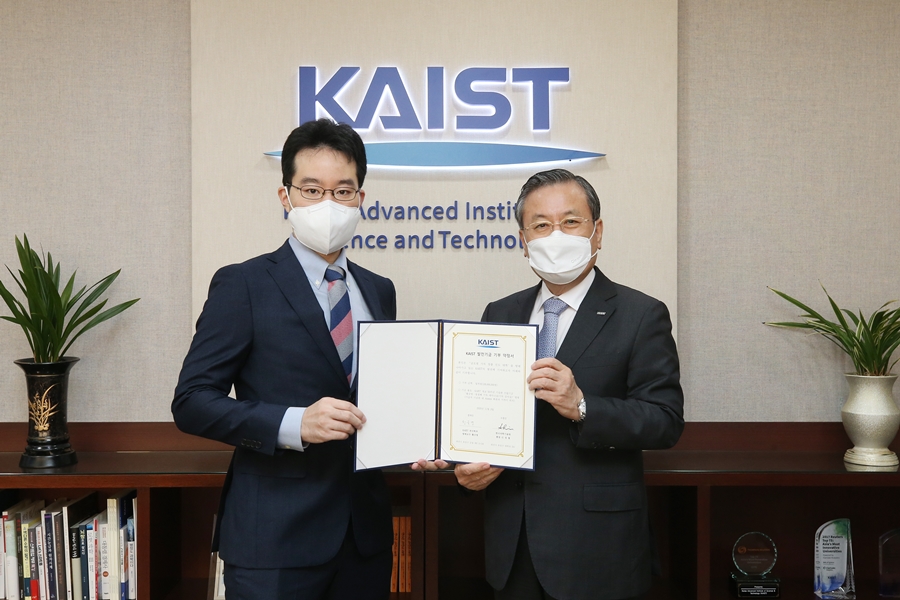 Professor Kyu-Young Whang Donates Toward the 50th Anniversary Memorial Building
Distinguished Professor Kyu-Young Whang from the School of Computing made a gift of 100 million KRW toward the construction of the 50th Anniversary Memorial Building during a ceremony on November 3 at the Daejeon campus. "As a member of the first class of KAIST, I feel very delighted to play a part in the fundraising campaign for the 50th anniversary celebration. This is also a token of appreciation to my alma mater and I look forward to alumni and the KAIST community joining this campaign," said Professor Emeritus Whang. KAIST will name the Kyu-Young Whang and Jonghae Song Christian Seminar Room at the 50th Anniversary Memorial Building. The ground will be broken in 2022 for construction of the building.
2020.11.04 View 7449
Professor Kyu-Young Whang Donates Toward the 50th Anniversary Memorial Building
Distinguished Professor Kyu-Young Whang from the School of Computing made a gift of 100 million KRW toward the construction of the 50th Anniversary Memorial Building during a ceremony on November 3 at the Daejeon campus. "As a member of the first class of KAIST, I feel very delighted to play a part in the fundraising campaign for the 50th anniversary celebration. This is also a token of appreciation to my alma mater and I look forward to alumni and the KAIST community joining this campaign," said Professor Emeritus Whang. KAIST will name the Kyu-Young Whang and Jonghae Song Christian Seminar Room at the 50th Anniversary Memorial Building. The ground will be broken in 2022 for construction of the building.
2020.11.04 View 7449 -
 Fundraising for the 50th Anniversary Memorial Building Kicks Off
KAIST started the fundraising campaign to construct the 50th Anniversary Memorial Building. This is one of the projects and events the 50th Anniversary Commemorative Committee established to celebrate the anniversary.
The ground will be broken in 2022 after raising approximately 50 billion KRW through 2021. The five-story building will be the latest addition to the KAIST campus. To highlight the campus’s history, the new building will connect the N5 (Basic Experiment & Research) and N2 (Administration Branch) buildings, the first buildings on the main Daejeon campus after its main campus moved from Seoul in 1987. Currently, the College of Business remains at the Seoul campus.
The 50th Anniversary Memorial Building will connect the two buildings in the shape of C, and represent KAIST’s C3 core value of Challenging, Creating, and Caring. The concept of this building was designed by Professor Sang-Min Bae from the Department of Industrial Design.
The 50th Anniversary Commemorative Committee said the Memorial Building will reflect the spirit of its core values. The first floor will accommodate the auditorium and exhibition hall, showcasing the latest achievements in KAIST innovation and convergence research as well as alumni startups and companies. The second floor will be an education space for entrepreneurship and video studios. An area for delivering creative education platforms such as Education 4.0 will be prepared on the third floor. The fourth floor will be used for global leadership education. The fifth floor will house the KAIST Club, a lounge for alumni and the Global Strategy Institute.
Co-Chair of the Fundraising & PR Sub-Committee of the KAIST 50th Anniversary Commemorative Committee and Former Vice President for Planning and Budget Seung-Bin Park and current Vice President for Planning and Budget Suchan Chae reiterated the importance of extending the infrastructure of the campus, saying that investments in the infrastructure will expand the university’s future growth potential. In a letter to kick off the fundraising efforts last month, they called for support from the entire KAIST community to help construct the new memorial building that will produce global talents and help young scientists make their dreams come true.
To donate, click here
2020.10.07 View 9129
Fundraising for the 50th Anniversary Memorial Building Kicks Off
KAIST started the fundraising campaign to construct the 50th Anniversary Memorial Building. This is one of the projects and events the 50th Anniversary Commemorative Committee established to celebrate the anniversary.
The ground will be broken in 2022 after raising approximately 50 billion KRW through 2021. The five-story building will be the latest addition to the KAIST campus. To highlight the campus’s history, the new building will connect the N5 (Basic Experiment & Research) and N2 (Administration Branch) buildings, the first buildings on the main Daejeon campus after its main campus moved from Seoul in 1987. Currently, the College of Business remains at the Seoul campus.
The 50th Anniversary Memorial Building will connect the two buildings in the shape of C, and represent KAIST’s C3 core value of Challenging, Creating, and Caring. The concept of this building was designed by Professor Sang-Min Bae from the Department of Industrial Design.
The 50th Anniversary Commemorative Committee said the Memorial Building will reflect the spirit of its core values. The first floor will accommodate the auditorium and exhibition hall, showcasing the latest achievements in KAIST innovation and convergence research as well as alumni startups and companies. The second floor will be an education space for entrepreneurship and video studios. An area for delivering creative education platforms such as Education 4.0 will be prepared on the third floor. The fourth floor will be used for global leadership education. The fifth floor will house the KAIST Club, a lounge for alumni and the Global Strategy Institute.
Co-Chair of the Fundraising & PR Sub-Committee of the KAIST 50th Anniversary Commemorative Committee and Former Vice President for Planning and Budget Seung-Bin Park and current Vice President for Planning and Budget Suchan Chae reiterated the importance of extending the infrastructure of the campus, saying that investments in the infrastructure will expand the university’s future growth potential. In a letter to kick off the fundraising efforts last month, they called for support from the entire KAIST community to help construct the new memorial building that will produce global talents and help young scientists make their dreams come true.
To donate, click here
2020.10.07 View 9129 -
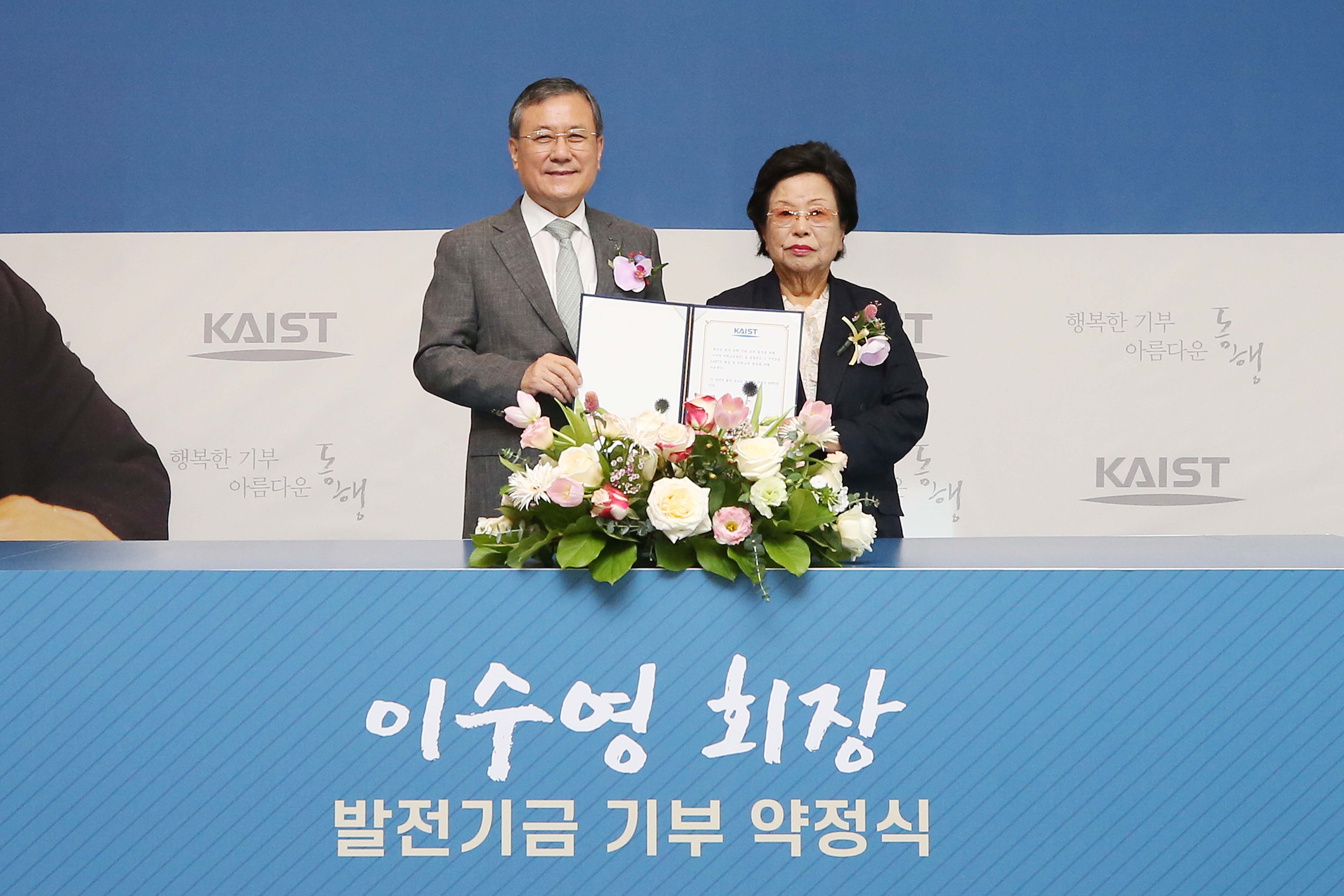 KAIST Receives $57 Million Donation to Enhance Research
The largest amount since the opening of KAIST will fund ‘Singularity Professors’
KAIST Development Foundation Chairman Soo-Young Lee made a gift of real estate estimated at approximately $57 million on July 23. This is the largest donation KAIST has received since it was founded in 1971.
The fund will establish the “Soo-Young Lee Science Education Foundation” and the proceeds of the foundation will go to the “Singularity Professors” as necessary resources to help make discoveries and design new approaches to accelerate breakthroughs.
“KAIST should be the institute that will produce first Korean Nobel laureate in the field of science. I hope this fund will be utilized to enable Korea to stand out in this challenging time by accomplishing breakthroughs nobody has never imagined,” said Chairman Lee during the donation ceremony at KAIST’s campus in Daejeon.
This is Chairman Lee’s third donation following the $6.7 million donation in 2012 and the $830,000 donation in 2016. Chairman Lee began her career as a journalist in 1963. In 1981, she started her own business by launching Kwangwon Ranch and became a successful businesswoman. In 1988, Chairman Lee established the real estate company Kwangwon Industries. After receiving an honorary doctorate from KAIST in 2012, she has served as the chairman of the KAIST Development Foundation from 2013. Chairman Lee expressed her intention to make another donation to KAIST in the near future during the news conference.
“People matter most for advancing the world. KAIST has a very distinct mission to foster the brightest minds and will drive the nation to move forward. I have worked with KAIST for quite long time so that I have a strong belief that KAIST is the one that will not only make contributions to Korea but also to all humanity,” she explained.
“For example, about one-fourth of the R&D manpower at Samsung Electronics is from KAIST. In 2019, Samsung Electronics recorded a revenue of approximately $206 billion which accounted for about 16% of national GDP. KAIST is the one that fosters global talents who are working at global company such as Samsung and many others.”
KAIST President Sung-Chul Shin also expressed his deep respect for Chairman Lee’s decision, saying that the entire KAIST community will make every effort to keep up Chairman Lee’s noble idea encouraging KAIST to push forward and help realize KAIST’s role and mission.
(END)
2020.07.23 View 9863
KAIST Receives $57 Million Donation to Enhance Research
The largest amount since the opening of KAIST will fund ‘Singularity Professors’
KAIST Development Foundation Chairman Soo-Young Lee made a gift of real estate estimated at approximately $57 million on July 23. This is the largest donation KAIST has received since it was founded in 1971.
The fund will establish the “Soo-Young Lee Science Education Foundation” and the proceeds of the foundation will go to the “Singularity Professors” as necessary resources to help make discoveries and design new approaches to accelerate breakthroughs.
“KAIST should be the institute that will produce first Korean Nobel laureate in the field of science. I hope this fund will be utilized to enable Korea to stand out in this challenging time by accomplishing breakthroughs nobody has never imagined,” said Chairman Lee during the donation ceremony at KAIST’s campus in Daejeon.
This is Chairman Lee’s third donation following the $6.7 million donation in 2012 and the $830,000 donation in 2016. Chairman Lee began her career as a journalist in 1963. In 1981, she started her own business by launching Kwangwon Ranch and became a successful businesswoman. In 1988, Chairman Lee established the real estate company Kwangwon Industries. After receiving an honorary doctorate from KAIST in 2012, she has served as the chairman of the KAIST Development Foundation from 2013. Chairman Lee expressed her intention to make another donation to KAIST in the near future during the news conference.
“People matter most for advancing the world. KAIST has a very distinct mission to foster the brightest minds and will drive the nation to move forward. I have worked with KAIST for quite long time so that I have a strong belief that KAIST is the one that will not only make contributions to Korea but also to all humanity,” she explained.
“For example, about one-fourth of the R&D manpower at Samsung Electronics is from KAIST. In 2019, Samsung Electronics recorded a revenue of approximately $206 billion which accounted for about 16% of national GDP. KAIST is the one that fosters global talents who are working at global company such as Samsung and many others.”
KAIST President Sung-Chul Shin also expressed his deep respect for Chairman Lee’s decision, saying that the entire KAIST community will make every effort to keep up Chairman Lee’s noble idea encouraging KAIST to push forward and help realize KAIST’s role and mission.
(END)
2020.07.23 View 9863 -
 COVID-19 Update: Fall Semester to Continue Offering Classes Online
KAIST announced that the university would continue online classes through the fall semester. However, the university will conduct additional in-person classes for upper-level undergraduate lab classes and some graduate courses where on-site interaction was deemed to be highly necessary. Some 600-level graduate courses at the Daejeon campus and graduate courses at the Seoul campus will carry out both in-person and online classes. The fall semester will start from August 31.
Provost and Executive Vice President Kwang Hyung Lee announced the fall semester plan in his letter to the entire student body on July 9. He said that the university decided to continue with online classes in consideration of the safety of KAIST community members and the current status of the COVID-19 spread. However, he said the new plan will help students choose class options between in-person and online classes.
“Although the number of classes with two versions is limited, we believe this will help many students continue learning without the sustained face-to-face contact that is inherent in residential education,” Provost Lee said.
In-person classes conducted in the fall semester will also be provided online for students who are not available for in-person classes. Students may choose the type of the classes they prefer according to their situation, among only the courses that will offer two versions. Professors will decide if they will conduct two versions of their classes. The Office of Academic Affairs is collecting the professors’ applications for conducting both versions until July 24.
KAIST offered real-time online classes and pre-recorded KLMS (KAIST Learning Management System) classes during the spring semester with a very limited number of in-person lab classes for graduate courses and these two versions of online class will continue for fall semester.
Provost Lee asked the students who will take the in-person classes to strictly observe all precaution measures as the university will do its best to abide by the government guidelines against the Covid-19 in preparation for the fall semester.
“We will continue to make appropriate and safe accommodations for them,” said Provost Lee.
Those who need to reside in on-campus dormitories are required to be approved for moving. The applications will open after all the in-person class schedules are fixed next month. However, students who were approved for staying in the dormitories last semester can move in without additional approval procedures for the fall semester.
(END)
2020.07.10 View 9717
COVID-19 Update: Fall Semester to Continue Offering Classes Online
KAIST announced that the university would continue online classes through the fall semester. However, the university will conduct additional in-person classes for upper-level undergraduate lab classes and some graduate courses where on-site interaction was deemed to be highly necessary. Some 600-level graduate courses at the Daejeon campus and graduate courses at the Seoul campus will carry out both in-person and online classes. The fall semester will start from August 31.
Provost and Executive Vice President Kwang Hyung Lee announced the fall semester plan in his letter to the entire student body on July 9. He said that the university decided to continue with online classes in consideration of the safety of KAIST community members and the current status of the COVID-19 spread. However, he said the new plan will help students choose class options between in-person and online classes.
“Although the number of classes with two versions is limited, we believe this will help many students continue learning without the sustained face-to-face contact that is inherent in residential education,” Provost Lee said.
In-person classes conducted in the fall semester will also be provided online for students who are not available for in-person classes. Students may choose the type of the classes they prefer according to their situation, among only the courses that will offer two versions. Professors will decide if they will conduct two versions of their classes. The Office of Academic Affairs is collecting the professors’ applications for conducting both versions until July 24.
KAIST offered real-time online classes and pre-recorded KLMS (KAIST Learning Management System) classes during the spring semester with a very limited number of in-person lab classes for graduate courses and these two versions of online class will continue for fall semester.
Provost Lee asked the students who will take the in-person classes to strictly observe all precaution measures as the university will do its best to abide by the government guidelines against the Covid-19 in preparation for the fall semester.
“We will continue to make appropriate and safe accommodations for them,” said Provost Lee.
Those who need to reside in on-campus dormitories are required to be approved for moving. The applications will open after all the in-person class schedules are fixed next month. However, students who were approved for staying in the dormitories last semester can move in without additional approval procedures for the fall semester.
(END)
2020.07.10 View 9717 -
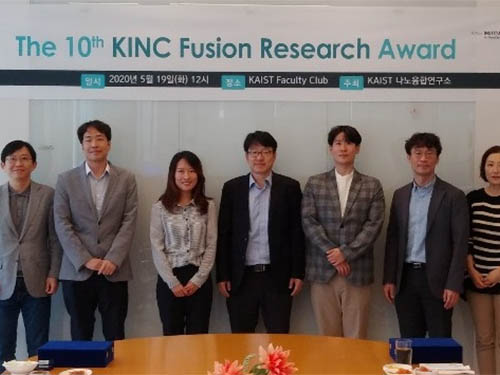 The 10th KINC Fusion Research Awardees
The KAIST Institute for NanoCentury (KINC) recognized three distinguished researchers whose convergence studies made significant impacts. The KINC presented the 10th KINC Fusion Research Awards during a ceremony that took place at KAIST’s main campus in Daejeon on May 19.
This year’s ‘best’ convergence research award went to a joint research group led by Professor Hee Tak Kim from the Department of Chemical and Biomolecular Engineering and Professor Sang Ouk Kim from the Department of Materials Science and Engineering. Their research, featured in the December 27 issue of Advanced Materials as a front cover article last year, introduced the world’s first high-energy efficiency, membraneless, flowless, zinc-bromine battery. This study, in which research professor Gyoung Hwa Jeong, postdoctoral researcher Yearin Byun, and PhD candidate Ju-Hyuck Lee took part as co-lead authors, is deemed as an example of a best practice in convergence research in which two groups’ respective expertise in the fields of carbon materials and electrochemical analysis created a synergistic effect.
Professor Bumjoon Kim from the Department of Chemical and Biomolecular Engineering was also recognized for having published the most interdisciplinary research papers on polymer electronics and nanomaterials at home and abroad.
Professor Hee-Tae Jung, the Director of KINC and the host of the KINC Fusion Research Awards, said, “The KINC is happy to announce the 10th awardees in nano-fusion research this year. Since convergence is crucial for making revolutionary changes, the importance of convergence studies should be recognized. Our institute will spare no effort to create a research environment suitable for convergence studies, which will be crucial for making a significant difference.”
The KINC was established in June 2006 under the KAIST Institute with the mission of facilitating convergence studies by tearing down boarders among departments and carrying out interdisciplinary joint research. Currently, the institute is comprised of approximately 90 professors from 13 departments. It aims to become a hub of university institutes for nano-fusion research.
(END)
2020.05.19 View 15856
The 10th KINC Fusion Research Awardees
The KAIST Institute for NanoCentury (KINC) recognized three distinguished researchers whose convergence studies made significant impacts. The KINC presented the 10th KINC Fusion Research Awards during a ceremony that took place at KAIST’s main campus in Daejeon on May 19.
This year’s ‘best’ convergence research award went to a joint research group led by Professor Hee Tak Kim from the Department of Chemical and Biomolecular Engineering and Professor Sang Ouk Kim from the Department of Materials Science and Engineering. Their research, featured in the December 27 issue of Advanced Materials as a front cover article last year, introduced the world’s first high-energy efficiency, membraneless, flowless, zinc-bromine battery. This study, in which research professor Gyoung Hwa Jeong, postdoctoral researcher Yearin Byun, and PhD candidate Ju-Hyuck Lee took part as co-lead authors, is deemed as an example of a best practice in convergence research in which two groups’ respective expertise in the fields of carbon materials and electrochemical analysis created a synergistic effect.
Professor Bumjoon Kim from the Department of Chemical and Biomolecular Engineering was also recognized for having published the most interdisciplinary research papers on polymer electronics and nanomaterials at home and abroad.
Professor Hee-Tae Jung, the Director of KINC and the host of the KINC Fusion Research Awards, said, “The KINC is happy to announce the 10th awardees in nano-fusion research this year. Since convergence is crucial for making revolutionary changes, the importance of convergence studies should be recognized. Our institute will spare no effort to create a research environment suitable for convergence studies, which will be crucial for making a significant difference.”
The KINC was established in June 2006 under the KAIST Institute with the mission of facilitating convergence studies by tearing down boarders among departments and carrying out interdisciplinary joint research. Currently, the institute is comprised of approximately 90 professors from 13 departments. It aims to become a hub of university institutes for nano-fusion research.
(END)
2020.05.19 View 15856 -
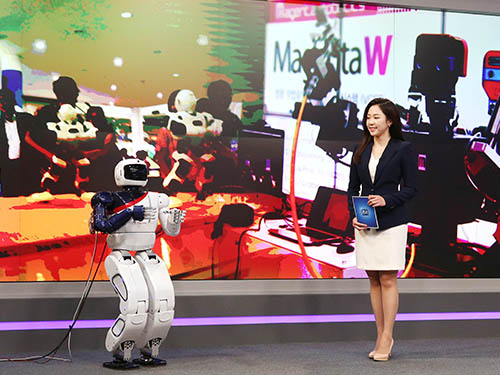 Hubo Debuts as a News Anchor
HUBO, a humanoid robot developed by Professor Jun-Ho Oh’s team, made its debut as a co-anchor during the TJB prime time news 8 on May 14.
“Un-contact" became the new normal after Covid-19 and many business solutions are being transformed using robotics. HUBO made two news reports on contactless services using robots in medical, manufacturing, and logistics industries. HUBO 2, the second generation of HUBO, appeared as a special anchor on the local broadcasting network’s special program in celebration of its 25th anniversary.
HUBO is the champion of the 2015 DARPA Robotics Challenge held in the USA. Its FX-2 riding robot also participated in the Olympic torch relay during the 2018 PyeongChang Winter Olympics.
Click here to watch a full video of HUBO anchoring the news.
(END)
2020.05.14 View 13825
Hubo Debuts as a News Anchor
HUBO, a humanoid robot developed by Professor Jun-Ho Oh’s team, made its debut as a co-anchor during the TJB prime time news 8 on May 14.
“Un-contact" became the new normal after Covid-19 and many business solutions are being transformed using robotics. HUBO made two news reports on contactless services using robots in medical, manufacturing, and logistics industries. HUBO 2, the second generation of HUBO, appeared as a special anchor on the local broadcasting network’s special program in celebration of its 25th anniversary.
HUBO is the champion of the 2015 DARPA Robotics Challenge held in the USA. Its FX-2 riding robot also participated in the Olympic torch relay during the 2018 PyeongChang Winter Olympics.
Click here to watch a full video of HUBO anchoring the news.
(END)
2020.05.14 View 13825 -
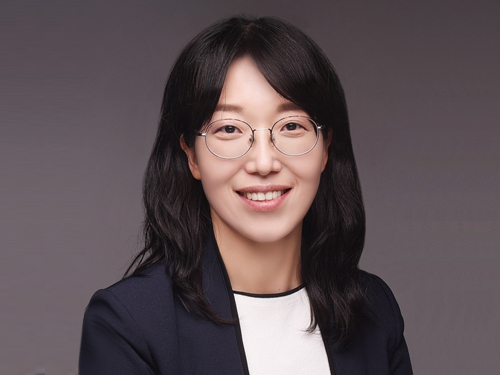 Professor Sukyung Park Named Presidential Science and Technology Adviser
Professor Sukyung Park from the Department of Mechanical Engineering was appointed as the science and technology adviser to the President Jae-in Moon on May 4. Professor Park, at the age of 47, became the youngest member of the president’s senior aide team at Chong Wa Dae.
A Chong Wa Dae spokesman said on May 4 while announcing the appointment, “Professor Park, a talent with a great deal of policymaking participation in science and technology, will contribute to accelerating the government’s push for science and technology innovation, especially in the information and communications technology (ICT) sector.”
Professor Park joined KAIST in 2004 as the first female professor of mechanical engineering. She is a biomechanics expert who has conducted extensive research on biometric mechanical behaviors. Professor Park is also a member of the KAIST Board of Trustees. Before that, she served as a senior researcher at the Korea Institute of Machinery and Materials (KIMM) as well as a member of the Presidential Advisory Council on Science and Technology.
After graduating from Seoul Science High School as the first ever two-year graduate, Professor Park earned a bachelor and master’s degrees in mechanical engineering at KAIST. She then finished her Ph.D. from the University of Michigan.
(END)
2020.05.06 View 15276
Professor Sukyung Park Named Presidential Science and Technology Adviser
Professor Sukyung Park from the Department of Mechanical Engineering was appointed as the science and technology adviser to the President Jae-in Moon on May 4. Professor Park, at the age of 47, became the youngest member of the president’s senior aide team at Chong Wa Dae.
A Chong Wa Dae spokesman said on May 4 while announcing the appointment, “Professor Park, a talent with a great deal of policymaking participation in science and technology, will contribute to accelerating the government’s push for science and technology innovation, especially in the information and communications technology (ICT) sector.”
Professor Park joined KAIST in 2004 as the first female professor of mechanical engineering. She is a biomechanics expert who has conducted extensive research on biometric mechanical behaviors. Professor Park is also a member of the KAIST Board of Trustees. Before that, she served as a senior researcher at the Korea Institute of Machinery and Materials (KIMM) as well as a member of the Presidential Advisory Council on Science and Technology.
After graduating from Seoul Science High School as the first ever two-year graduate, Professor Park earned a bachelor and master’s degrees in mechanical engineering at KAIST. She then finished her Ph.D. from the University of Michigan.
(END)
2020.05.06 View 15276 -
 14-Day Drawing Challenge Helps Maintain a Sense of Connection Amid Prolonged Social Distancing
- “You need space, but you also need connections.” -
Schools and workplaces have closed and people are staying at home around the globe. Governments across the world have urged their people to keep a distance from others as a measure to slow the spread of the pandemic.
With the Korean government’s decision to extend the intensive social distancing campaign until at least April 19, people in Korea are advised to avoid nonessential trips, public facilities, and social gatherings for another two weeks or so.
This unprecedented prolonged social distancing drive leads people to feel fatigue and frustration. Such emotional stress is worse for those who live alone in a foreign country.
The International Scholar and Student Services (ISSS) Team at KAIST has been working around the clock to build a dedicated COVID-19 Mental Health Support Service to support the university’s international community on campus and abroad and help get them connected online.
As the COVID-19 situation lingers, there has been a growing demand for mental health support from many KAIST international members including 299 students who have been staying in Korea on their own and away from their families, as well as from those who could not return to campus from their overseas homes.
In response to this, the KAIST ISSS Team has been offering some special online events and programs that can help the KAIST international community stay feeling connected whereever they are, while still keeping a safe distance from each other.
For instance, the team is running an art-therapy program called ‘The 14-day Drawing Challenge’ March 30 through April 12. This program is online and individual-based, so it does not require any physical contact between participants.
Each participant is asked to draw a picture at home using the daily topics previously set by the ISSS Team over 14 days. The topics include (Day 1) self-portrait, (Day 2) spring flowers, (Day 3) if you could become anything…, (Day 4) funniest memory you have, (Day 5) animals at KAIST, (Day 6) something you love, (Day 7) country or city you want to visit, (Day 8) what’s for dinner? (Day 9) person you miss, (Day 10) your favorite place at KAIST, (Day 11) your feeling today, (Day 12) things in your favorite color, (Day 13) song lyrics, and (Day 14) your future self in 10 years.
Once all 14 pieces have been completed, submissions can be made online by sending an e-mail to the ISSS Team after scanning or taking a photo of each drawing. Selected submissions will be awarded small prizes for participation and shared through the university’s official website and SNS channels.
“All the participants need is paper, coloring tools, and their creativity and imagination. They don’t have to be a great artist to join this challenge. There is no right or wrong or good or bad. They just need to have fun drawing every day for two weeks, ease their coronavirus anxiety, and remain emotionally stable just like they did back in the normal days,” said Su-yeon Ahn, the manager of the KAIST ISSS Team. She added, “In times like these, you need space, but you also need connections. Our team wants our international students, professors, and researchers to build strong connections with each other, even online.”
Katherine Michelle Pena Santana, an M.S. candidate from the Department of Industrial and Systems Engineering who is taking part in ‘The 14-day Drawing Challenge,’ looked back and said, “Lately with the new coronavirus spreading around Korea and the entire world, I was feeling very anxious. I didn't get out of my room and lived by just looking at the same walls and creating some kind of a psychological burden on myself.”
Santana added that these kinds of activities could give many foreign members of KAIST an opportunity to not only relieve fear and stress, but also share each other’s experiences dealing with this pandemic. She explained that this is why she decided to participate in this challenge.
An undergraduate student from the Department of Physics, Ada Carpenter, appreciated the KAIST ISSS Team’s efforts to provide a variety of special online mental health support services to help the university’s international community socialize, while strictly following the government’s guidelines for social distancing. She expressed excitement about participating and said, “I’m so looking forward to the challenge of things that I wouldn’t normally draw.”
< Short Self-interview Video Clip Filmed by Ada Carpenter >
The COVID-19 Mental Health Support Service by the KAIST ISSS Team will be continually updated with new information and enhanced with other tools and support over the coming weeks and months. Some of the upcoming events and programs include ‘The Online Guitar Lessons’, ‘The Growing Houseplants Challenge’, and ‘The Any Song Challenge*’.
* The song titled “Any Song” by Korean rapper Zico has been gaining attention on social media thanks to many celebrities taking on the ‘Any Song Challenge’, performing a short dance to the chorus of the song and sharing it on social media.
(END)
2020.04.08 View 11788
14-Day Drawing Challenge Helps Maintain a Sense of Connection Amid Prolonged Social Distancing
- “You need space, but you also need connections.” -
Schools and workplaces have closed and people are staying at home around the globe. Governments across the world have urged their people to keep a distance from others as a measure to slow the spread of the pandemic.
With the Korean government’s decision to extend the intensive social distancing campaign until at least April 19, people in Korea are advised to avoid nonessential trips, public facilities, and social gatherings for another two weeks or so.
This unprecedented prolonged social distancing drive leads people to feel fatigue and frustration. Such emotional stress is worse for those who live alone in a foreign country.
The International Scholar and Student Services (ISSS) Team at KAIST has been working around the clock to build a dedicated COVID-19 Mental Health Support Service to support the university’s international community on campus and abroad and help get them connected online.
As the COVID-19 situation lingers, there has been a growing demand for mental health support from many KAIST international members including 299 students who have been staying in Korea on their own and away from their families, as well as from those who could not return to campus from their overseas homes.
In response to this, the KAIST ISSS Team has been offering some special online events and programs that can help the KAIST international community stay feeling connected whereever they are, while still keeping a safe distance from each other.
For instance, the team is running an art-therapy program called ‘The 14-day Drawing Challenge’ March 30 through April 12. This program is online and individual-based, so it does not require any physical contact between participants.
Each participant is asked to draw a picture at home using the daily topics previously set by the ISSS Team over 14 days. The topics include (Day 1) self-portrait, (Day 2) spring flowers, (Day 3) if you could become anything…, (Day 4) funniest memory you have, (Day 5) animals at KAIST, (Day 6) something you love, (Day 7) country or city you want to visit, (Day 8) what’s for dinner? (Day 9) person you miss, (Day 10) your favorite place at KAIST, (Day 11) your feeling today, (Day 12) things in your favorite color, (Day 13) song lyrics, and (Day 14) your future self in 10 years.
Once all 14 pieces have been completed, submissions can be made online by sending an e-mail to the ISSS Team after scanning or taking a photo of each drawing. Selected submissions will be awarded small prizes for participation and shared through the university’s official website and SNS channels.
“All the participants need is paper, coloring tools, and their creativity and imagination. They don’t have to be a great artist to join this challenge. There is no right or wrong or good or bad. They just need to have fun drawing every day for two weeks, ease their coronavirus anxiety, and remain emotionally stable just like they did back in the normal days,” said Su-yeon Ahn, the manager of the KAIST ISSS Team. She added, “In times like these, you need space, but you also need connections. Our team wants our international students, professors, and researchers to build strong connections with each other, even online.”
Katherine Michelle Pena Santana, an M.S. candidate from the Department of Industrial and Systems Engineering who is taking part in ‘The 14-day Drawing Challenge,’ looked back and said, “Lately with the new coronavirus spreading around Korea and the entire world, I was feeling very anxious. I didn't get out of my room and lived by just looking at the same walls and creating some kind of a psychological burden on myself.”
Santana added that these kinds of activities could give many foreign members of KAIST an opportunity to not only relieve fear and stress, but also share each other’s experiences dealing with this pandemic. She explained that this is why she decided to participate in this challenge.
An undergraduate student from the Department of Physics, Ada Carpenter, appreciated the KAIST ISSS Team’s efforts to provide a variety of special online mental health support services to help the university’s international community socialize, while strictly following the government’s guidelines for social distancing. She expressed excitement about participating and said, “I’m so looking forward to the challenge of things that I wouldn’t normally draw.”
< Short Self-interview Video Clip Filmed by Ada Carpenter >
The COVID-19 Mental Health Support Service by the KAIST ISSS Team will be continually updated with new information and enhanced with other tools and support over the coming weeks and months. Some of the upcoming events and programs include ‘The Online Guitar Lessons’, ‘The Growing Houseplants Challenge’, and ‘The Any Song Challenge*’.
* The song titled “Any Song” by Korean rapper Zico has been gaining attention on social media thanks to many celebrities taking on the ‘Any Song Challenge’, performing a short dance to the chorus of the song and sharing it on social media.
(END)
2020.04.08 View 11788 -
 Former Minister of Science and Technology Woo Sik Kim Elected as New Chairman of Board of Trustees
Dr. Woo Sik Kim, former Minister of Science and Technology and Deputy Prime Minister, was elected as the new chairman of the KAIST Board of Trustees on March 26. Dr. Kim will succeed Chairman Jang-Mu Lee, whose three-year term expired last month.
Dr. Kim is a chemical engineering professor who spent most of his academic career at Yonsei University from 1968. In 2000, he held the office of president of Yonsei University for four years before moving to the Presidential Office of President Roh Moo-Hyun as his chief of staff in 2004. After serving in the Blue House for two years, he served as the Minister of Science and Technology from 2006 to 2008.
An emeritus fellow of the National Academy of Engineering of Korea (NAEK), Chairman Kim also taught at KAIST as an invited distinguished professor from 2008 to 2010. He is currently the chairman of the Creativity Engineering Institute (CEI).
(END)
2020.04.06 View 14326
Former Minister of Science and Technology Woo Sik Kim Elected as New Chairman of Board of Trustees
Dr. Woo Sik Kim, former Minister of Science and Technology and Deputy Prime Minister, was elected as the new chairman of the KAIST Board of Trustees on March 26. Dr. Kim will succeed Chairman Jang-Mu Lee, whose three-year term expired last month.
Dr. Kim is a chemical engineering professor who spent most of his academic career at Yonsei University from 1968. In 2000, he held the office of president of Yonsei University for four years before moving to the Presidential Office of President Roh Moo-Hyun as his chief of staff in 2004. After serving in the Blue House for two years, he served as the Minister of Science and Technology from 2006 to 2008.
An emeritus fellow of the National Academy of Engineering of Korea (NAEK), Chairman Kim also taught at KAIST as an invited distinguished professor from 2008 to 2010. He is currently the chairman of the Creativity Engineering Institute (CEI).
(END)
2020.04.06 View 14326